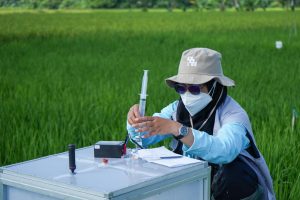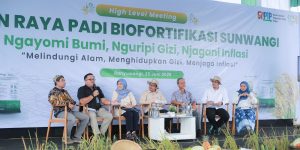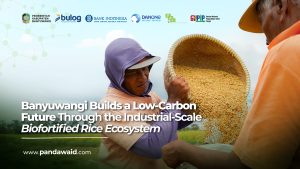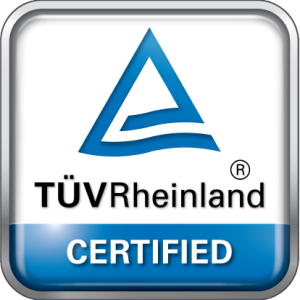A multi-stakeholder initiative integrates innovation, local governance, and sustainable agriculture to tackle hidden hunger and volatile food prices.
Banyuwangi, Indonesia – June 25, 2025 – A strategic multi-stakeholder alliance in Banyuwangi, East Java, is accelerating the development of Indonesia’s first industrial-scale biofortified rice ecosystem through a landmark collaboration involving PT Terra Agro Yields, Danone-AQUA, IPB University, the Banyuwangi Regency Government, Perum Bulog, and most recently, the Central Bank of Indonesia (Bank Indonesia).
This pentahelix partnership–uniting the private sector, academia, government, communities, and media–now also aligns with Bank Indonesia’s National Movement for Food Inflation Control (GNPIP), reinforcing its systemic impact both on health and economic stability.
The initiative was spotlighted during a Grand Harvest (Panen Raya) event on June 25, 2025, which celebrated its progress and gathered stakeholders including farmers, local and central government representatives, academics, and development partners.
A key milestone of the event was the signing of a Memorandum of Understanding on the Development of Biofortified Rice Ecosystem and Industry, solidifying a collective commitment to improving nutrition and stabilizing food prices across Indonesia.
The program directly contributes to national objectives on nutrition security, food system transformation, and climate resilience. Its focus on biofortified rice complements Indonesia’s broader strategies to address stunting and improve public health outcomes.
“Biofortified rice is a strategic solution to combat ‘hidden hunger’ at scale. We’re moving beyond treating deficiencies to preventing them through staple foods, starting at the source,” said Prof. Dr. Evy Damayanthi, a professor of nutrition and food science at IPB University.
Dr. Nurjaeni, Director for National Nutrition System at the National Nutrition Agency, emphasized the relevance of this initiative to Indonesia’s long-term nutrition roadmap. “Strengthening nutrition begins from the farm,” he said. “Biofortified rice provides a food-based approach to reducing micronutrient deficiencies and aligns with the government’s Free Nutritious Meals Program and national stunting prevention targets. This collaboration represents how upstream innovation can support downstream policy priorities.”
Juni 2025, yang turut dihadiri oleh petani, perwakilan pemerintah, akademisi, dan para mitra terkait.
Advancing Nutritional Quality from the Ground Up
At the core of the initiative is the cultivation of biofortified rice varieties enriched with iron and zinc—micronutrients essential for child development and maternal health. The pilot phase covered 5 hectares using Nutrizinc, a variety with 25-50% more iron and zinc than conventional rice.
While Nutrizinc delivered strong nutritional outcomes, the next phase introduced improved seed varieties such as IPB 9G and IPB 15S, while also exploring other biofortified rice lines with high nutritional value. These varieties combine high micronutrient content with better yields, making them more suitable for broader adoption.
“This is where the power of plant breeding plays a critical role,” said Prof. Dr. Hajrial Aswidinnoor, the breeder behind the varieties. “We aim to provide rice that not only nourishes better, but also empowers farmers through higher productivity.”

mengatasi kekurangan zat gizi mikro, sejalan dengan Program Makan Bergizi Gratis dan target
penurunan stunting nasional, sekaligus menunjukkan bahwa inovasi di hulu dapat memperkuat proses
hilirisasi.
Climate-Smart and Locally Grounded Innovation
To ensure sustainable and productive cultivation, the initiative integrates PPAI Technology® from PT Terra Agro Yields, a Banyuwangi-based agricultural innovator. Developed to improve plant and soil health, the technology has proven effective in making farming practices both more eco-friendly and profitable.
In addition, the program employs Alternate Wetting and Drying (AWD), a climate-resilient irrigation method that reduces water usage and minimal environmental impact. When used together, PPAI Technology® and AWD significantly enhance the environmental performance of rice farming.
Field research led by IPB University found that the application of PPAI Technology tends to reduce methane emissions by 24%, while the combination of AWD and PPAI Technology makes rice cultivation 213% more water-efficient compared to conventional methods. This directly to Indonesia’s agricultural climate targets.
“This research shows that, with the right technologies and practices, rice—a crop often seen as water-intensive — can be grown in a way that conserves water, cuts emissions, and remains productive,” said Kukuh Roxa, CEO of PT Terra Agro Yields.
IPB’s University Secretary Prof. Dr. Ir. Agus Purwito added, “This is a demonstration of how academic innovation—ranging from seed development to emissions measurement can be applied directly to transform farming systems on the ground.”
Building Nutrition Infrastructure Through Pentahelix Collaboration
A defining strength of this initiative lies in its integrated value chain approach. Beyond production, the collaboration ensures access to stable markets through institutional off-takers such as Perum Bulog, enabling both demand consistency and traceability.
“As we prepare to implement the Free Nutritious Meals Program at scale, access to nutrient-rich, traceable staple foods is essential,” said Langgeng Wisnu, Head of the East Java Regional Office of Perum Bulog. “This effort goes beyond logistics—it’s about laying the groundwork for a nutrition-first national food system.”
Echoing this vision, Danone-AQUA recognizes this as part of its sustainability roadmap (Danone Impact Journey) to improve health through food, which focuses on three main pillars: Health, Nature, and People & Communities.
“We are committed to building a fully integrated ecosystem across the entire value chain, guided by a holistic approach that interlinks nutritional improvement, environmental sustainability, and the enhancement of farmer livelihoods,” said Ratih Anggraeni, Head of Public Affairs & Sustainability at Danone-AQUA.
Biofortified Rice Innovation to Strengthen Food Security and Curb Inflation
The program’s multi-dimensional benefits have drawn support from Bank Indonesia, which views the initiative as a strategic effort to strengthen food price stability over the medium and long term by boosting agricultural productivity and ensuring consistent supply.
This aligns closely with the objectives of the National Movement to Control Food Inflation (GNPIP), which prioritizes increased productivity and added value of local food commodities. Through this program, Bank Indonesia fosters multi-stakeholder collaboration to strengthen regional food production capacity and enhance competitiveness.
The development of biofortified rice aligns with inflation control efforts, particularly since rice holds the largest weight in Banyuwangi’s inflation index. This initiative not only supports price stability but also contributes to better community nutrition outcomes.
With strong support from the Banyuwangi Regency Government, the program has expanded and is set to scale up to 500 hectares of sustainable cultivation by 2026—directly contributing to national goals on stunting reduction and climate mitigation.
“This collaboration shows that local governments can be powerful catalysts for systemic change,” said Banyuwangi Regent Ipuk Fiestiandani. “By integrating high-nutrition seeds, climate-resilient practices, and reliable market access, we are transforming villages into hubs of innovation.”
She concluded, “Banyuwangi is proud to serve as a living laboratory for inclusive, sustainable agriculture. Through this initiative, we are not only tackling today’s challenges, but also helping shape the future of food in Indonesia.”
***
About PT Terra Agro Yields
PT Terra Agro Yields is an agri-life science company based in Indonesia. Founded in 2014, PAI is committed to enhancing farmers’ productivity while protecting the environment and promoting biodiversity. As the only company currently pioneering innovations in pesticide-reducing products, PAI provides scalable solutions for farmers to reduce excessive chemical synthetics in agriculture. Their innovative formulations and technology have been utilized on farms across Indonesia and Malaysia, promoting sustainable farming practices that protect the environment and uplifting farmers’ welfare.
For more information visit www.tagroyields.com.
For media enquiries, please contact:
Corporate Sustainability and Communications
PT Terra Agro Yields
info@tagroyields.com








